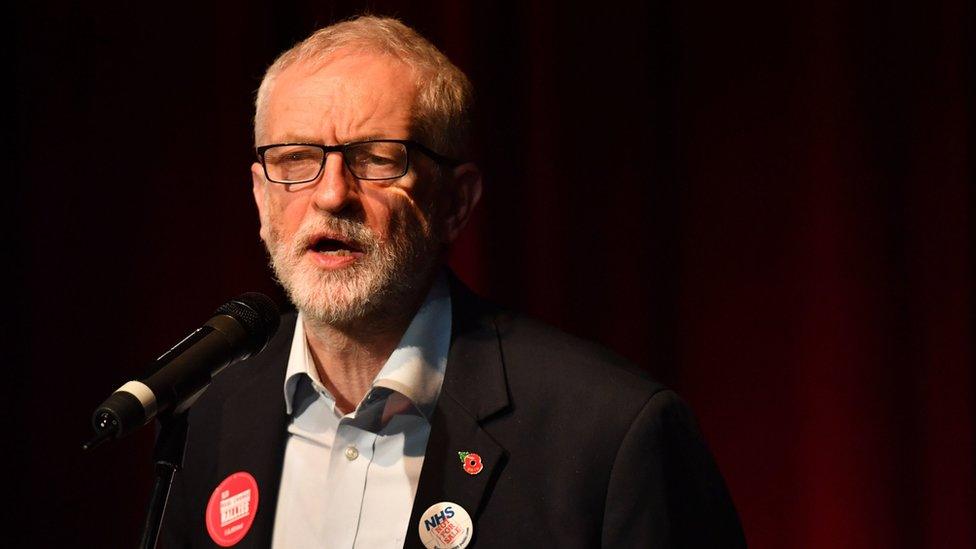General election 2019: Can Jeremy Corbyn convince voters to believe?
- Published

Jeremy Corbyn excites and delights a chunk of the electorate.
Day after day on this campaign we will see him being greeted rapturously by crowds of his supporters, queuing in the cold for a chance of hearing him (or getting a selfie).
But it is also true that he is sometimes a turn-off for traditional Labour supporters.
And concerns about his handling - or failure to handle - racism against Jews adequately has caused deep alarm.
There was no love lost between Ian Austin and Jeremy Corbyn.
They are from different sides of Labour. And the anti-Semitism crisis has particular potency for Mr Austin, whose father escaped the Nazis as a refugee.
But to hear Mr Austin not just raise fears about the Labour leader, but advocate voting for a Tory prime minister instead is jaw-dropping.
Mr Austin says he could "hardly believe that it has come to this".
The former MP is inevitably being accused in this era of brutal politics of being a secret Tory all along, or a Blairite. That just doesn't hold water though.
If you've been around in Westminster for long enough, you'd know that he was one of Gordon Brown's loyal and powerful henchmen - devoted to Labour's cause for years, fighting the Tories, and often Tony Blair's faction too, day by day.
Yes Mr Austin was appointed a trade envoy to the government. But MPs and peers from all of the different political parties take on those unpaid roles.
It doesn't mean that he is employed by the Tories.
For example, Rushanara Ali, the Labour candidate for Bethnal Green in east London does the same role for Bangladesh.
And for others still in the party, Mr Austin's remarks this morning - which you can listen to here - represent much more than a source of embarrassment and pain because of one man's view.
'Choice to stay'
It is a challenge to those who share his concern but have stuck with the party.
I have talked time and again to Labour MPs and shadow ministers who have expressed similar opinions, but who haven't walked away like Mr Austin did - or Luciana Berger, the female Jewish MP who felt hounded out.
Those others have made the choice that staying in the party, and trying to combat the problem, is more important.
There are also plenty of others who believe that the issue has been overdone, and used by the very many internal enemies who have been unhappy about Mr Corbyn being the leader from day one.
It is also the case that there is a small but vocal group of Jewish members who hold that view too.
But this is a genuine problem in this election for Labour, highlighted by Mr Austin's interview this morning and it's two fold.
Former Labour MP Ian Austin tells the BBC's Today programme that Jeremy Corbyn is "completely unfit to lead our country"
Firstly, there is despair and disbelief at how several years after it emerged as a prominent issue under Mr Corbyn's leadership, Labour is still struggling to combat the problem.
For a party that prides itself in campaigning against all kinds of racism, many in the movement feel shame - particularly that the Equality and Human Rights Commission is carrying out an official investigation.
Mr Corbyn has repeatedly said he is doing all he can. But simply, not everyone in the party buys that, let alone in the Jewish community.
The Jewish Chronicle, external even published a stark front page today appealing to the country not to back him. And whatever the rights and wrongs here, that may cost them seats.
One Labour candidate suggested this morning there were several constituencies where Jewish voters have abandoned Labour and make it likely the party will lose that area.
Where Labour is the challenger, they can't afford to fail anywhere and they need to be gaining to stand a real chance.
Even tonight, a Labour candidate had to quit after a blog she wrote emerged where she compared Israel to an abused child who grows up to be an abusive adult, suggesting allegations of anti-Semitism against the party were "orchestrated by the wealthy establishment".
Faith in the leader
Secondly, the missteps over anti-Semitism speak to an anxiety about the wider public's faith in the leader, and belief in his ability to get things done.
Many of his own candidates wonder if he can't stamp out an internal problem quickly and convincingly, how would he meet the challenges of running the country?
One shadow minister, who is loyal to him, said from his experiences of talking to voters on the doorsteps "people just don't want to trust him".
Choosing a prime minister is a matter of faith. And Mr Corbyn's opponent in this race certainly has a complicated relationship with the truth.
Boris Johnson's reputation for sticking to what he says is hardly glossy. It would be amazing if in the course of the campaign the prime minister's record of misleading claims doesn't catch up with him.
But it's not an answer for either of the main parties just to point the finger at the other's flaws.
"Whataboutery", as the political tactic is known these days, is transparent and unconvincing, and sadly on all sides very familiar these days.
But if Mr Corbyn has a proper shot at victory in the next few weeks, he must persuade voters beyond his core to believe in him.
Days like today make that challenge even harder.
